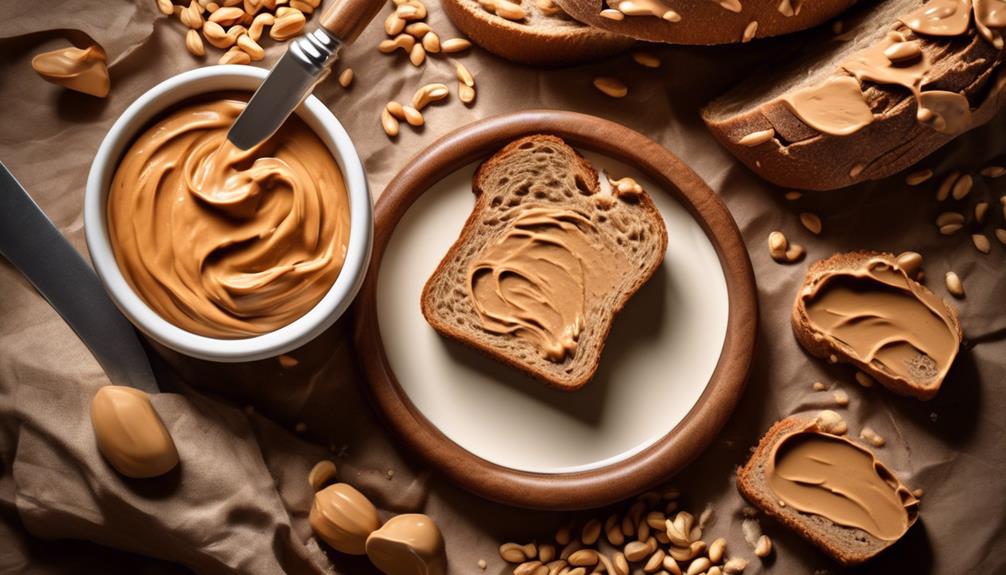Peanut butter packs a nutritious punch with approximately 8 grams of protein, a few grams of carbs, and healthy monounsaturated fats per serving. It’s rich in essential micronutrients like vitamin E, magnesium, and potassium that support overall health. With about 2 grams of fiber, it aids digestion and keeps you feeling full. This snack fits well into various diets and offers many benefits. Discover even more about its advantages and how to incorporate it into your routine!
Key Takeaways
- Peanut butter provides approximately 8 grams of protein per serving, supporting muscle repair and growth.
- It contains 3-4 grams of carbohydrates per serving, contributing to energy intake.
- The majority of fats in peanut butter are healthy monounsaturated fats, promoting heart health.
- Rich in micronutrients like vitamin E, magnesium, and potassium, it supports overall health and bodily functions.
- Each serving includes about 2 grams of dietary fiber, aiding digestion and promoting satiety.

When you think about nutritious snacks, peanut butter often comes to mind as a delicious option packed with benefits. It’s not just tasty; it’s also rich in essential nutrients that can support your overall health. Peanut butter’s macronutrient profile is impressive, providing a good balance of proteins, fats, and carbohydrates. Each serving contains about 8 grams of protein, which helps you build and repair tissues, making it a great post-workout snack. The healthy fats found in peanut butter, mainly monounsaturated fats, can promote heart health by helping to lower bad cholesterol levels. Plus, with about 3-4 grams of carbohydrates, it can easily fit into various dietary plans.
You’ll also find that peanut butter is an excellent source of micronutrients. It’s packed with vitamins and minerals like vitamin E, magnesium, and potassium, all of which play *essential* roles in maintaining your body’s functions. Vitamin E acts as an antioxidant, protecting your cells from damage, while magnesium supports muscle and nerve function. Potassium helps regulate blood pressure and fluid balance, making peanut butter a well-rounded addition to your diet.
When it comes to fiber, peanut butter doesn’t disappoint. A typical serving contains around 2 grams of dietary fiber, which aids digestion and helps keep you feeling full longer. This can be particularly beneficial if you’re trying to manage your weight or simply want to avoid unnecessary snacking. Pairing peanut butter with fruits, veggies, or whole-grain bread enhances the fiber content even more, providing a satisfying and nutritious snack.
Now, let’s talk about storage. Knowing the right storage tips can help you maximize the shelf life of your peanut butter. Most commercially prepared peanut butter can last about 6 to 9 months when unopened, while opened jars can generally last 3 to 6 months if stored in a cool, dry place. If you prefer to keep it fresh for longer, consider refrigerating it, which can extend its shelf life, although it may become thicker and harder to spread. Always check for signs of spoilage, such as an off smell or separation, and make sure to seal the jar tightly after each use to maintain its quality.
Incorporating peanut butter into your diet not only satisfies your taste buds but also enriches your nutrition. Farmhouse decor can inspire creative ways to serve and enjoy snacks like peanut butter, adding to the overall warmth of your kitchen and dining experience. Enjoy it in moderation, and you’ll reap the benefits of this delightful spread.
Frequently Asked Questions
Can Peanut Butter Aid in Weight Loss or Gain?
Peanut butter can aid in weight loss or gain, depending on how you use it. If you control your calorie intake, its satiety benefits can help you feel fuller, reducing your overall consumption. However, if you’re looking to gain weight, incorporating it into your meals can boost your caloric intake effectively. Just remember to enjoy it in moderation, as it’s calorie-dense, and balance it with your overall dietary needs.
Is Natural Peanut Butter Healthier Than Processed Versions?
Yes, natural peanut butter is generally healthier than processed versions. For example, when you compare the ingredient lists, natural peanut butter typically contains just peanuts and maybe a pinch of salt, while processed varieties often include added sugars and unhealthy oils. By choosing natural, you’re cutting out unnecessary additives and embracing a cleaner product. This simple switch can help you feel better about your choices and support your overall health.
How Does Peanut Butter Affect Cholesterol Levels?
Peanut butter can positively affect cholesterol levels, contributing to cholesterol reduction. When you include peanut butter in your diet, its healthy fats can help improve your lipid profile, potentially lowering LDL (bad cholesterol) while raising HDL (good cholesterol). This balance promotes heart health, making it a great addition to a heart-friendly diet. Just make sure to enjoy it in moderation to reap the benefits without overdoing the calories.
Can Peanut Allergies Be Managed With Peanut Butter?
“Don’t put all your eggs in one basket.” When it comes to peanut allergy management, relying solely on peanut butter isn’t a solution. If you have a peanut allergy, consuming peanut butter can trigger serious reactions. Instead, explore alternative peanut butter allergy solutions, like sunflower seed butter or other nut butters. Always consult with a healthcare professional for a tailored plan to manage your allergy safely and effectively. Safety first!
What Are Some Peanut Butter Alternatives for Allergies?
If you’re looking for peanut butter alternatives due to allergies, there are several great nut allergy substitutes. Sunflower seed butter is a popular choice, offering a similar texture and taste. You might also try soy nut butter or pumpkin seed butter for allergy-friendly spreads. These options provide a delicious way to enjoy spreads without the risk of triggering allergies. Just be sure to check for cross-contamination to stay safe!
Conclusion
In the world of nutrition, peanut butter stands out as a delicious powerhouse, but do you really know its full potential? Beyond its creamy texture and rich flavor, it’s packed with healthy fats, protein, and essential nutrients. However, the truth is that moderation is key; too much can lead to unwanted weight gain. So, next time you spread it on your toast, remember: it’s not just a treat; it’s a choice that can nourish your body and fuel your passion.









